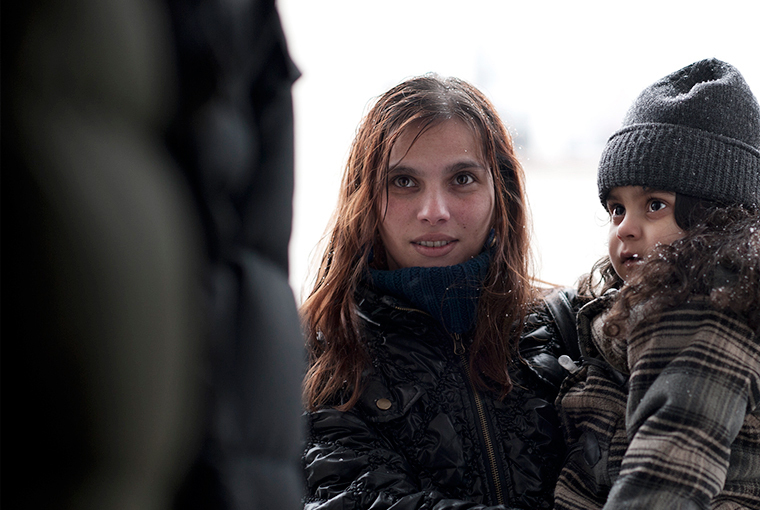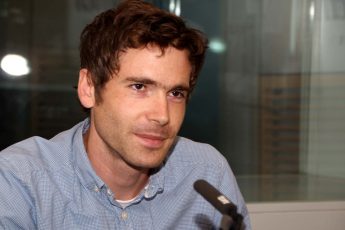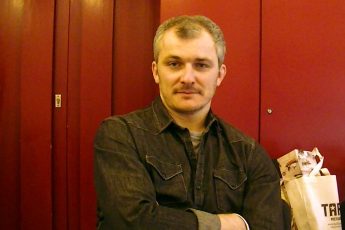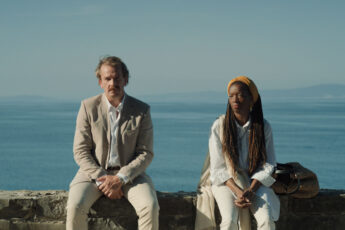
The apple never falls far from the apple tree,” says the doctor to Žaneta, a young Roma woman, during a medical examination. Though he uses this phrase to demonstrate the heredity of an illness, he also recalls other contexts, in which the same sentence could apply to social stigmatization. The fate of the Roma seems to be sealed: most of them are condemned to live in poverty and criminality. The protagonist of The Way Out resists that curse and tries to live a “normal” life.
Žaneta (Klaudia Dudová) is on maternity leave with her three-year-old daughter. She lives in the northern area of the Czech Republic with her husband David (David Ištok) and her younger sister Cuckoo (Natálie Hlaváčová). When the family can no longer pay the bills, David and Žaneta try their best to find full-time jobs. But due to their lack of education and work experience, they are rejected everywhere. In this difficult situation, they both get tempted by a neighbor, Andrea (Mária Ferencová-Zajacová) to make illegal money. While David is willing to get involved, Žaneta is uncompromising. Honor is more important than anything else to her, and so she decides to move away with her baby and Cuckoo.
Roma protagonists rarely get depicted in Czech feature films. Besides Zdenek Tyc, the director of Smradi (2002) and El Paso (2009), Petr Václav is one of the few filmmakers to treat the subject. 18 years after his Silver Leopard-winner first feature Marian (1996), he here turns to the Roma community once more and depicts the current problems of Czech Roma in a disquieting way.
This time Václav focuses on a female protagonist. With the portrayal of Žaneta, he breaks with the stereotype of the lazy, miscreant Roma. Unlike Jiri Vejdelek’s comedy-road movie ROMing (Jiŕí Vejdelek, 2007), in which the lead character is portrayed by Bolek Polívka, or in the scenic black-and-white Polish movie Papusza (Joanna Kos and Krzysztof Krauze, 2013), Václav uses real characters in realistic situations. These are accompanied by a documentary-like visual style reminiscent of his experience as a documentary filmmaker. Václav is careful not to create counter-stereotypes. For example, the film doesn’t suggest that Žaneta is an exceptional character; instead she is represented as an average young woman who struggles for a better quality of life. Her character recalls last year’s Miracle (directed by Juraj Lehotskỳ) and its teenage protagonist, Ela, who tries to escape from a correctional facility and from “inherited” poverty and unhappiness.
The most important value of the movie is its ability to address both Roma and non-Roma viewers, recreating ghetto life in a believable way. Its weak point is obviously the script (written by Václav himself): besides the documentary-like scenes, the movie sometimes risks falling into melodrama, mafia film (a pretty ridiculous Don keeps threatening David due to his debt), film noir (where Andrea turns into a kind of femme fatal character) and comedy (testified by the characters of David’s bothers). Sometimes the movie feels didactic in its attempt to demonstrate that it is possible for a Roma to escape poverty. Dialogues, in which the protagonists over-emphasize the importance of education, work and assimilation or the dangerous temptation of criminality and alcohol are unnatural and estranging.
The film’s mixture of popular genres makes it difficult to grasp its position on the most uncomfortable questions, like the responsibility of the non-Roma minority in this situation, segregation in education, or racist murders. The movie doesn’t take as much risk as for instance Benedek Fliegauf’s Just the Wind. But The Way Out shows reverse inter-ethnic relations: it gives great examples about “Gadjos” who are welcome and helped by the Gypsy communities when they are in need. What a thought-provoking idea!
Despite its didactic flaws, one can’t help but praise the way how Roma protagonists are represented in the movie: realistic, without stereotypes and exoticisation. The Way Out is an important movie which tells previously untold stories about the Czech society.




Leave a Comment